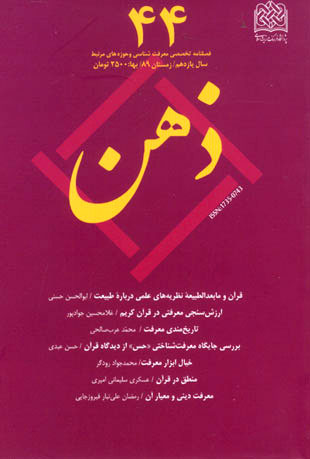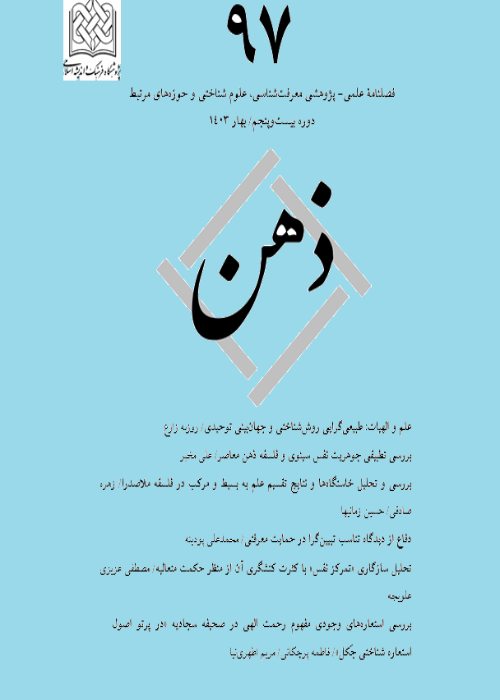فهرست مطالب

فصلنامه ذهن
سال یازدهم شماره 4 (پیاپی 44، زمستان 1389)
- 240 صفحه، بهای روی جلد: 25,000ريال
- تاریخ انتشار: 1389/11/19
- تعداد عناوین: 7
-
صفحه 37
-
صفحه 71
-
صفحه 139
-
صفحه 169
-
صفحه 193
-
Page 5The present article studies some metaphysical foundations of natural sciences which may be inferred from the Holy Quran. In the old and existing natural sciences, such foundations have been neglected; but they may be considered in the future natural sciences to attain a new trend in this regard. The main rule of the Quranic metaphysics for studies in the field of natural sciences is the Unity of Acts. The second rule in this field is that the order of the world of nature rests upon Divine wisdom. According to the third rule, there is some meaning for each and every thing in the world; and this meaning depends upon its vertical and horizontal relations. Concepts through which we make reports of things suggest the meanings of things. Concepts suggesting the thing itself, free from its relations, are so universal concepts that have no uses for applied sciences. Two Quranic key concepts to find the meanings of things are admonition and look at their dominion. Quranic physics is not based on determinism. On the contrary, concepts such as thing's glorifying [God], change in an earlier Divine ruling, and supra-natural presence are introduced in it. Also that laws govern nature is explained by an ordained order.Keywords: metaphysics, physics, causation, order of nature, meaningfulness of nature
-
Page 37Study of knowledge, its components, and issues concerning it is one of the important and fundamental points introduced in disciplines such as epistemology, philosophy, logic, critical thinking, and philosophy of science. The Holy Quran which is a Divine Book and a Letter of Guidance, has discussed this issues, spoken of value and assessment of knowledge, and other problems concerning it, each of which demands for an independent study. Through a study of the Holy Quran, this writing has proceeded to gather standards introduced by this Noble Book to assess human sciences and arguments. the Holy Quran looks at this important issue at three levels: one, in terms of the extent of one's commitment to his own belief and its correspondence to reality (kind of knowledge) such as certainty, opinion, and the like; two, in terms of the way that a belief is acquired and supported (ways to acquire knowledge) such as following the carnal desires, imitation, and the lie; and the last, in terms of the methodology of argumentation and explanation of the claims (case study) such as fallacies, rejection!Keywords: knowledge, the Holy Quran, assessment, fallacy, argumentation
-
Page 71Having explained its subject matter, the present article studies and criticizes historicity of knowledge, and in this, it will look at the Islamic and Quranic view to the following issues as well: - Ontological basis of historicity of knowledge - Anthropological basis historicity of knowledge - Fluidity of the meaning of the text and historicity of knowledge According to the present writing, absolute historicity if knowledge is rejected, and its various foundations in the philosopher hermeneutics is seriously questioned. Of course, it accepts some kind of historicity of knowledge in the sense that neither all human knowledge is historical nor all human beings; but, in a more accurate look, some parts of human being's knowledge are historical. The Holy Quran regards knowledge, since it may be realized, as possible, and even realized; and reports of sciences which human beings have found without being influenced by historical conditions; and such sciences will be everlasting; proofs for this have been discussed in the present writing.Keywords: historicity, knowledge, philosophical hermeneutics, meaning of the text, the Holy Quran
-
Page 107In epistemology, some things are introduced as tools to acquire knowledge, one of which is "sense". By "sense", we mean five senses which are as follows: senses of vision, hearing, taste, smell, and touch. In epistemology, each and every tool to acquire knowledge is studied independently, and validity as well as the extent of such validity is discussed in details. The question which will be discussed here is "what is the epistemological status of sense according to the Holy Quran?" According to the results of this study, (1) when creating man, God has created tools of sense perception for him as well; (2) sense perception will be realized if there are some conditions and situations; (3) some things may prevent complete realization of sense perception; (4) things which may prevent sense perception are not restricted to material ones; but rather, some spiritual ones may play their roles in this regard as well; (5) to reject the truth is one of the things which may veil sense perception; (6) sense perceptions and in particular perceptions through eyes and ears are gates to cordial perception; and (7) there is some relation between sense perception and other sources of knowledge. To study this problem, while referring to philosophical texts and sources and employing an analytical-rational methodology, the author has posed some questions. Also, through following a correct interpretive methodology, the replies provided by the Holy Quran for such questions have been deduced.Keywords: sense, vision, hearing, the Holy Quran, epistemology, knowledge
-
Page 139The faculty of imagination changes sensible things to imaginal ones in an ascending motion, and intelligibles to imaginations in a descending motion. Thus, as an epistemic tool, imagination plays a key role to store forms taken by the common sense from [external] senses. Ontologically, the world of imagination and ideas is a level of the levels of existence; and epistemologically, imagination is an intermediate between two existential realms of man; and it is a faculty from among man's inner faculties as well as a manifestation of "the Fashioner". If connected to the discontiguous imagination and purified, imagination will be able to intuit immaterial things of the world of imagination, and will find many kinds of knowledge, and its realization in the human soul will be clearer, and true. In the Holy Quran, imagination is a faculty from among man's inner faculties and plays an important role in the world of dreams and intuition of the truths of being.Keywords: imagination, contiguous, discontiguous imagination, purification of imagination, epistemology, dream
-
Page 169The Holy Quran introduces itself as being revealed in clear Arabic and containing no crookedness. Thus, its teachings should be based on the rules of understanding including the rules to understand logic which are laws of thinking and reasoning; and the Holy Quran recommends us to reflect upon it. Thus, rules of logic should be taken into account in the Holy Quran. Many Quranic phrases may be regarded as descriptive definitions or essential definitions. Also, in the Holy Quran the first, second, and third forms of conjugate syllogisms and contiguous and discontiguous interpellative syllogisms have been identified. Ghazali and Mulla Sadra have called them, respectively, the major balance, the middle balance, the minor balance, and the balance of mutual implication. Such balances have been explicitly and sometimes implicitly employed.Keywords: essential definition, descriptive definition, real definition, nominal definition, major balance, middle balance, minor balance, balance of mutual implication, balance of opposition, implicit syllogism, compound syllogism
-
Page 193Religious knowledge is deduced from religion through methodological and justified attempts. As a knowledge of the first order, this product is divided into various kinds such as ordinances, creeds, ethics, religious sciences and the like. External and rational study of such sciences is of the kind of "philosophies of" (philosophy of religion knowledge) and knowledge of the second order. Philosophy of religion knowledge studies the existing and realized sciences in the realm of religion rationally and externally (study of the second order). One of the issues discussed in the philosophy of religion knowledge is the standard for religiosity of knowledge. That is why the subject matter of the present article is of the kind of issues discussed in "philosophies of", a part of philosophy of religion knowledge, and a look of the second order at religious knowledge. In this article, the author has tried, at first, to study the nature of religion knowledge; then, in what follows, he explains the standard of its religiosity. Various standards have been posed and assessed for religious knowledge among which we may mention religiosity of the principles, contents, methodology, end, uses, sources, means and the like. In conclusion, through a final analysis, it has been said that a single item cannot be mentioned as a standard for religiosity; but rather, this term is applied to some kinds of knowledge equivocally. Similarities and dissimilarities between such kinds depend upon various points.Keywords: nature of religion knowledge, standard for religion knowledge, positive standard, negative standard, religion science


